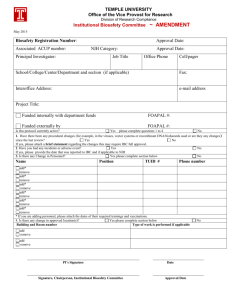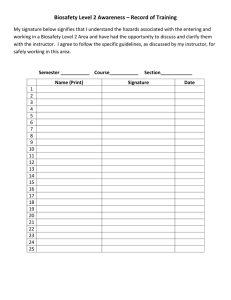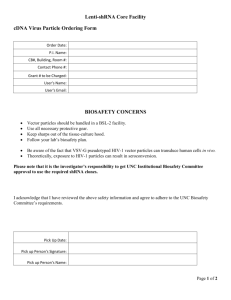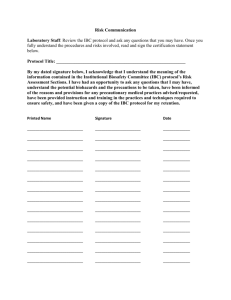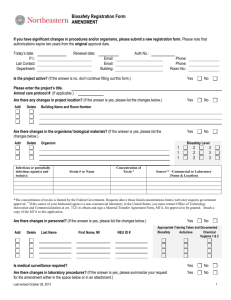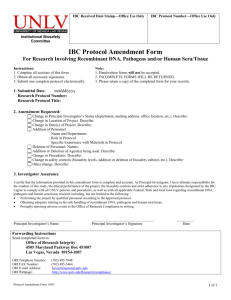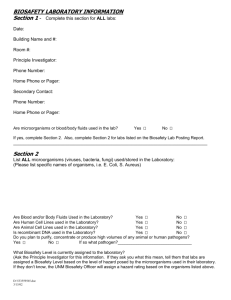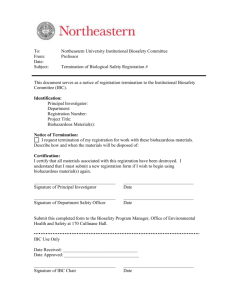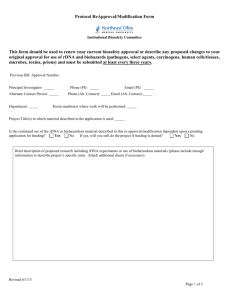Biomedical & Chemical Waste Training VOLUME 1 ISSUE 2 NOVEMBER, 2006
advertisement
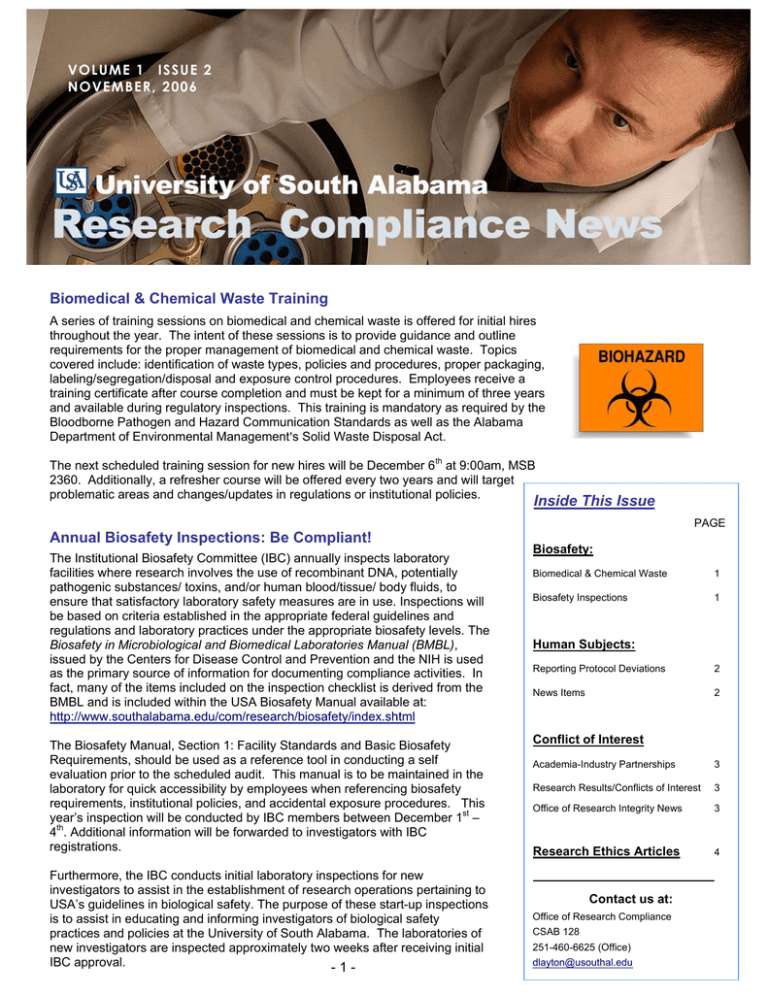
VOLUME 1 ISSUE 2 NOVEMBER, 2006 Biomedical & Chemical Waste Training A series of training sessions on biomedical and chemical waste is offered for initial hires throughout the year. The intent of these sessions is to provide guidance and outline requirements for the proper management of biomedical and chemical waste. Topics covered include: identification of waste types, policies and procedures, proper packaging, labeling/segregation/disposal and exposure control procedures. Employees receive a training certificate after course completion and must be kept for a minimum of three years and available during regulatory inspections. This training is mandatory as required by the Bloodborne Pathogen and Hazard Communication Standards as well as the Alabama Department of Environmental Management=s Solid Waste Disposal Act. The next scheduled training session for new hires will be December 6th at 9:00am, MSB 2360. Additionally, a refresher course will be offered every two years and will target problematic areas and changes/updates in regulations or institutional policies. Inside This Issue PAGE Annual Biosafety Inspections: Be Compliant! The Institutional Biosafety Committee (IBC) annually inspects laboratory facilities where research involves the use of recombinant DNA, potentially pathogenic substances/ toxins, and/or human blood/tissue/ body fluids, to ensure that satisfactory laboratory safety measures are in use. Inspections will be based on criteria established in the appropriate federal guidelines and regulations and laboratory practices under the appropriate biosafety levels. The Biosafety in Microbiological and Biomedical Laboratories Manual (BMBL), issued by the Centers for Disease Control and Prevention and the NIH is used as the primary source of information for documenting compliance activities. In fact, many of the items included on the inspection checklist is derived from the BMBL and is included within the USA Biosafety Manual available at: http://www.southalabama.edu/com/research/biosafety/index.shtml The Biosafety Manual, Section 1: Facility Standards and Basic Biosafety Requirements, should be used as a reference tool in conducting a self evaluation prior to the scheduled audit. This manual is to be maintained in the laboratory for quick accessibility by employees when referencing biosafety requirements, institutional policies, and accidental exposure procedures. This year’s inspection will be conducted by IBC members between December 1st – 4th. Additional information will be forwarded to investigators with IBC registrations. Furthermore, the IBC conducts initial laboratory inspections for new investigators to assist in the establishment of research operations pertaining to USA’s guidelines in biological safety. The purpose of these start-up inspections is to assist in educating and informing investigators of biological safety practices and policies at the University of South Alabama. The laboratories of new investigators are inspected approximately two weeks after receiving initial IBC approval. -1- Biosafety: Biomedical & Chemical Waste 1 Biosafety Inspections 1 Human Subjects: Reporting Protocol Deviations 2 News Items 2 Conflict of Interest Academia-Industry Partnerships 3 Research Results/Conflicts of Interest 3 Office of Research Integrity News 3 Research Ethics Articles 4 Contact us at: Office of Research Compliance CSAB 128 251-460-6625 (Office) dlayton@usouthal.edu Reporting Protocol Deviations: IRB Requirements A protocol deviation is a divergence or departure from the expected conduct of an approved study which is not consistent with the current protocol and/or consent document. It is noted that deviations/violations are clearly related to the protocol or regulations rather than adverse events which are medical outcomes to patients (ie, death, hospitalization, allergic reaction, etc) The role of the IRB committee is to collaborate with researchers to ensure the rights and welfare of participants are protected. As such, a new reporting policy has been implemented for reporting deviations/violations and is available on the human subjects website at: http://www.southalabama.edu/com/research/humansubjects/devviolatio n.doc IRB deviations/violations that involve the following must be reported: - Potential increased risk to subjects - Impacted the scientific integrity of the study - Impacted the rights and welfare of subjects - Violates an ethical principle - Urgent action to eliminate an immediate hazard to a subject is the only acceptable protocol deviation and the event must be explained in writing to the study sponsor and to the IRB, as soon as possible. Of importance, the reporting policy does not include deviations that are due to non-compliance of the subject ( e.g., subject did not return as scheduled, subject refused a repeat blood sample). As the investigative site as no control over the actions of the subjects’, these instances are excluded from the reporting policy. However, subject’s should be educated on study adherence or be removed from study participation. NEWS ITEMS The DHHS Office of Human Research Protections (OHRP) has developed an International Compilation of Human Subject Research Protections. The compilation can be found on the OHRP website at: http://www.hhs.gov/ohrp/international/index.html#NatlPol and lists the laws, regulations and guidelines of over 50 countries. Suggestions for newsletter improvements or contributions are welcomed – please email the Office of Research Compliance and Assurance: dlayton@usouthal.edu OHRP has added a Frequently Asked Questions page on Investigator Responsibilities available at: http://www.hhs.gov/ohrp/faq.html NIH has announced the launch of a national consortium that will transform how clinical and translational research is conducted, ultimately enabling researchers to provide new treatments more efficiently and quickly to patients. This new consortium, funded through Clinical and Translational Science Awards (CTSAs), begins with 12 academic health centers (AHCs) located throughout the nation. An additional 52 AHCs are receiving planning grants to help them prepare applications to join the consortium. When fully implemented in 2012, about 60 institutions will be linked together to energize the discipline of clinical and translational science. For anonymous web-based surveys, participants must be presented with consent information, but would be informed that their consent is implied by submitting the completed survey. This can be accomplished by clicking on a “I accept” link on the cover letter/consent page. Contact information should be provided on this page to include a e-mail address in addition to a telephone number(s) to withdraw consent. Investigators must request a waiver of informed consent (45 CFR 46.117)in the IRB application documenting how and why written consent would not be appropriate. Additional information on this topic will be covered in the next issue of Research Compliance News. -2- Addressing Conflicts of Interest with Academia-Industry Partnerships The Federation of American Societies for Experimental Biology (FASEB) released a report in July 2006 themed Shared Responsibility, Individual Integrity: Scientists Addressing Conflict of Interest in Biomedical Research. This report discusses issues involving risks and challenges to investigators in four types of academia-industry relationships: research contracts, consulting/board membership, entrepreneurial activities and training or education. The report notes that “approximately one-quarter of academic faculty members receive research funding from industry, representing close to $2 billion in 2004” and emphasizes the role of the investigator in maintaining integrity of research by avoiding conflicts of interest. The report portrays a “consensus statement on overarching principles and voluntary standards for the conduct and management of these types of interactions from the scientists’ perspective.” Furthermore, FASEB was awarded a grant of more than $112,000 from the Office of Research Integrity in order to address the issues of conflict of interest management in biomedical research. Senior policy analyst of FASEB, Laura Brockway, Ph.D., states “there is a clear need for voluntary standards for the conduct of academia-industry interactions.” To view the report and 19 guiding principles to help investigators address conflict of interest challenges, visit FASEB’s website at: http://opa.faseb.org/pages/Advocacy/coi.htm Source of Information: Report on Research Compliance, August 2006 Office of Research Integrity News Research Results & Financial Conflicts of Interest The Journal of American Medical Association (JAMA) recently announced modifications in their requirements on conflict of interest, citing many inconsistencies amongst other journals. The publication of research results is one potential area involving conflicts of interest. JAMA will soon require all authors to disclose all potential conflicts of interest at the time of manuscript submission in the acknowledgment section. “Authors are expected to provided detailed information about all relevant financial interests/relationships or financial conflicts within the past 5 years and the foreseeable future.” Of importance, JAMA has no threshold on the amount or value and therefore will require complete disclosure of potential conflicts and relevant financial relationships. (example: authors of a manuscript about diabetes would report all financial relationships they have with all manufacturers of products used in the management of diabetes). For additional details on JAMA policies, go to: http://jama.ama-assn.org/cgi/content/full/296/2/220 -3- The Office of Research Integrity (ORI) has available instructional tools/materials on responsible conduct of research to include conflicts of interest. This information may be accessed at: http://ori.dhhs.gov/education/products/rcr_conflict.shtml Furthermore, get news posted on the ORI instantly by subscribing to the RSS Feeds services. This new service allows you to obtain noteworthy information as soon as it is posted on the ORI website. Visit http://ori.hhs.gov/StayInformed/newsfeed for more information. Research Ethics Articles "Bayer’s Duplicity on Drug Safety," Editorial, The New York Times, October 4, 2006 Web journals threaten peer-review system: Scientists frustrated with academic journals can publish research online," by Alicia Chang, Associated Press, October 1, 2006; http://msnbc.msn.com/id/15067950/. “Ethics Rule Send NIH Scientists Packing,” Monterey Herald, October 28, 2006 "Nearly 40 percent of the scientists conducting hands-on research at the National Institutes of Health say they are looking for other jobs or are considering doing so to escape new ethics rules that have curtailed their opportunity to earn outside income…" FDA Regulation of Stem-Cell Based Therapies, Halme and Kessler, New England Journal of Medicine, 355: 1730-1735, October 19, 2006; http://content.nejm.org/cgi/content/extract/355/16/1730 Newsletter archives are available through the Office of Research Compliance website at: http://www.southalabama.edu/com/research/ -4-
